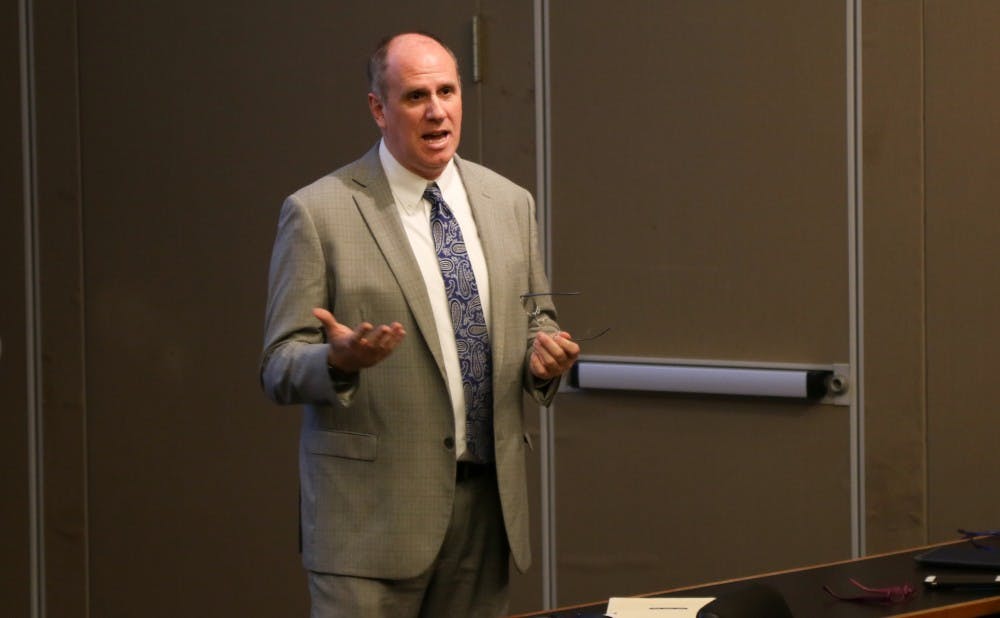Duke Student Government Senate heard from Stephen Bryan, director of the Office of Student Conduct, about last year's conduct cases and senior Dev Dabke, chief justice of the judiciary, about a new initiative.
At the end of the student conduct process, students are asked to rank their experience on a scale of one to five, with higher scores representing satisfactory experiences. Bryan noted that the average of all responses is more than four.
“By and large students are very satisfied," he said. "People who go through the process think it is fair.”
Bryan told the Senate that his office received 829 reports during the 2016-2017 academic year. He added that 68 percent, or 560, of those reports were informal resolutions, while 266 required formal resolutions. This number represents a decline in the total reports from what OSC saw in 2015-2016, when the office had 1076 reports.
The 560 informal reports include 89 faculty-student resolutions, 375 residence coordinator resolutions, 92 amnesty and four OSC informal resolution. If the report is on a disciplinary record, it is a formal resolution. Otherwise, it is an informal resolution.
Out of the formal reports lodged in the 2016-2017 school year, the majority of these reports—299—were resolved through students meeting with administrators. Of those, Bryan said that 97 percent of students felt satisfied with the administrative resolution. Bryan explained that such students who accept responsibility for their actions to represent a “great characteristic of our community.”
If students opt to pursue the complaint further, they have the opportunity to have a hearing with the Undergraduate Conduct Board. With the 21 cases taken to the Board this past year, only seven were appealed—out of those seven, six were denied and one was granted. Bryan explains that most appeals are denied because the Office wants to “make sure it does not violate procedure” and do not provide unfair advantages of “providing new evidence” for a specific side of the case.
The Office of Student Conduct declared 12 formal resolutions to have no probable cause, dropping all charges within the complaint from the accused students' records. The final avenue of formal resolutions occurs when the accused is unavailable for the hearing or the complaint is withdrawn—there were four cases of this. Currently, there are three pending reports.
Cases of sexual misconduct are evaluated based on the standard of a preponderance of evidence—meaning that OSC only has to determine that it is more likely than not the law was violated. All other complaints through the OSC utilize a 75 percent confidence level that the violation occurred—otherwise known as the "clear and convincing standard."
Students can become involved in the Office of Student Conduct through its Disciplinary Advisor program, Undergraduate Conduct Board and Office of Student Conduct Advisory Group.
Bryan also discussed the Duke Community Standard. He said that through the standard—which every student signs before beginning their time at Duke—is important, he understands that students are imperfect people.
“We try to aspire to these every day, but I have probably failed in one of these today," he said. "We all do. We’re human.”
Bryan also noted that Duke’s response to academic integrity issues is generally similar to its peers.
“Overall, Duke suspends more students than Ivy plus institutions, but it’s really hard to say because there is such discrepancy in standards,” Bryan said.
Bryan also briefly remarked on The Chronicle's coverage of student conduct, also more broadly commenting on the nature of student journalism in general.
"If I corrected all the errors in The Chronicle, I would be doing that all day long," he said. "Duke Chronicle doesn’t always get the information correct."
In other business
Dabke presented to the Senate about the judiciary’s new Office of Public Advocacy. Aiming to maximize the accessibility of the judiciary branch, Dabke emphasized the new initiative as a way to target cases of greater pertinence to the student body.
"Typically, we sit in our office and do things, and no one knows about it," Dabke said.
He noted that the judiciary has had issues with inclusion and diversity in the past, saying that "historically, we haven't done a good job of this."
"The judiciary is fairly male-identified, fairly strong representation of international students—which I think is kind of nice. Thirty percent of the judiciary is first-generation college students," he said. "Our ideological make-up is pretty well-balanced, though perhaps we are more conservative for Duke. We are also fairly independent [in terms of student group affiliation], although those who are affiliated are affiliated with Greek life."
He said he hopes that an improved relationship with the student body will further ensure that the judiciary is respecting students' rights.
“Part of our legitimacy comes from students trusting us,” said Dabke.
Additionally, the Senate approved funding for Duke International Relations Association, Hindu Students Association, International Association, Inside Joke and Lambda Theta Alpha.
Get The Chronicle straight to your inbox
Signup for our weekly newsletter. Cancel at any time.

Stefanie Pousoulides is The Chronicle's Investigations Editor. A senior from Akron, Ohio, Stefanie is double majoring in political science and international comparative studies and serves as a Senior Editor of The Muse Magazine, Duke's feminist magazine. She is also a former co-Editor-in-Chief of The Muse Magazine and a former reporting intern at PolitiFact in Washington, D.C.

